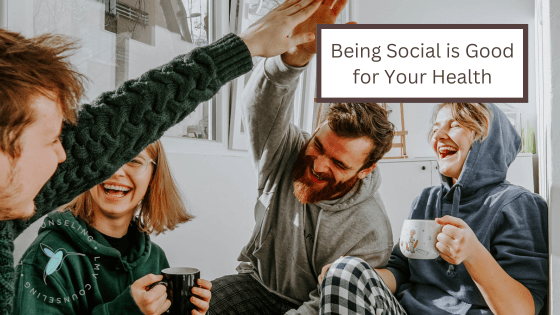The newly released report from the surgeon general cites loneliness as the new epidemic. Did you know that lacking social connection is as bad for your health as 15 cigarettes a day?! This trend is concerning and has been growing over the years. Our lives have become increasingly spent online with less time spent growing face to face relationships.
In this blog, we will discuss the impact of social relationships on our health, why they matter and tips to get started building new relationships.
Social Relationships and Our Health
When we feel lonely and don’t have enough social connections, it can affect our health. It can make us feel sad and stressed, and it may even lead to problems with our body, like heart issues and trouble sleeping. Studies show that poor social connections lead to a risk of heart disease, stroke, diabetes, and a poor immune response.
Our mental health is also effected by loneliness. Our thought processes and memory gets worse. This is of importance for our senior citizens who are already struggling with memory difficulties or dementia. Individuals who lack social connections also are at a greater risk for anxiety, depression, self harm and suicide.
It’s being connected to the people around you, like your friends and family. Having strong relationships and spending time with others can make a big difference in how we feel. That’s why social connection is so important!
What is Social Connection?
What is social connection, you ask? Well, it’s all about having people in your life who care about you and who you care about. It’s about spending time together, talking, laughing, and supporting each other. Social connections include informal relationships to deep close relationships. You may not consider the interactions that are informal like talking to the store clerk as helpful, but they are! It helps you to practice attuning to social cues and pick up on nuances that you can apply to deeper more meaningful relationships.
Benefits of Social Connections
Let’s take a look at some of the benefits of social connections.
- Happiness and Joy: When we spend time with our friends and family, it makes us feel happy and brings joy to our lives. We can share fun moments, play games, and create memories together.
- Support and Help: Life can sometimes be challenging, and that’s when having strong social connections becomes even more important. When we’re going through tough times, our friends and family can be there to support us, offer a listening ear, or help us find solutions to our problems.
- Feeling Loved and Accepted: Being connected to others means that we feel loved and accepted just the way we are. We don’t have to pretend to be someone else or worry about being judged. Our friends and family accept us for who we are, flaws and all. We all want to feel like we belong.
- Learning and Growing: When we spend time with others, we can learn new things and grow as individuals. Our friends and family can teach us new skills, share their experiences, and help us see the world in different ways.
How Do I Build More Social Connections?
Here are a few simple ideas:
- Spend Quality Time Together: Make an effort to spend time with your friends and family. You can have fun by playing games, going for a walk, or simply talking and laughing together. Try to make an effort to see them in person. Online connections don’t provide you with the psychological boost like in person connections.
- Be a Good Listener: When someone is talking to you, listen carefully and show that you care about what they’re saying. Don’t just listen to create your own response in your head. Ask questions and be interested in what they have to say. This helps create a deeper connection.
- Show Kindness and Respect: Treat others with kindness and respect. Be there for your friends when they need you, and be understanding and supportive. Small acts of kindness and respect can provide a psychological boost for your brain. Try holding the door open for someone, smiling at a stranger, making small talk at a store or restaurant.
- Join Clubs or Activities: Get involved in activities or clubs where you can meet new people who share similar interests. This can help you expand your social circle and make new friends. Volunteering can be a great way to show kindness and build social relationships!
It’s normal to sometimes feel shy or nervous about making new friends. But don’t worry, many people feel the same way. Just be yourself and be open to new experiences. If you have not been out and about trying to make new friends or social connections, it can be challenging at first. Remember, like any new skill, it takes practice and it gets easier the more you do it.
Reach out to your friends and family, spend quality time together, and cherish the connections you have. By nurturing these relationships, you’re creating a happier and more fulfilling life for yourself and those around you.
If you are having a tough time making and maintaining social relationships, it maybe time to seek some professional help from our trained therapist. Reach out and let’s get started now.

